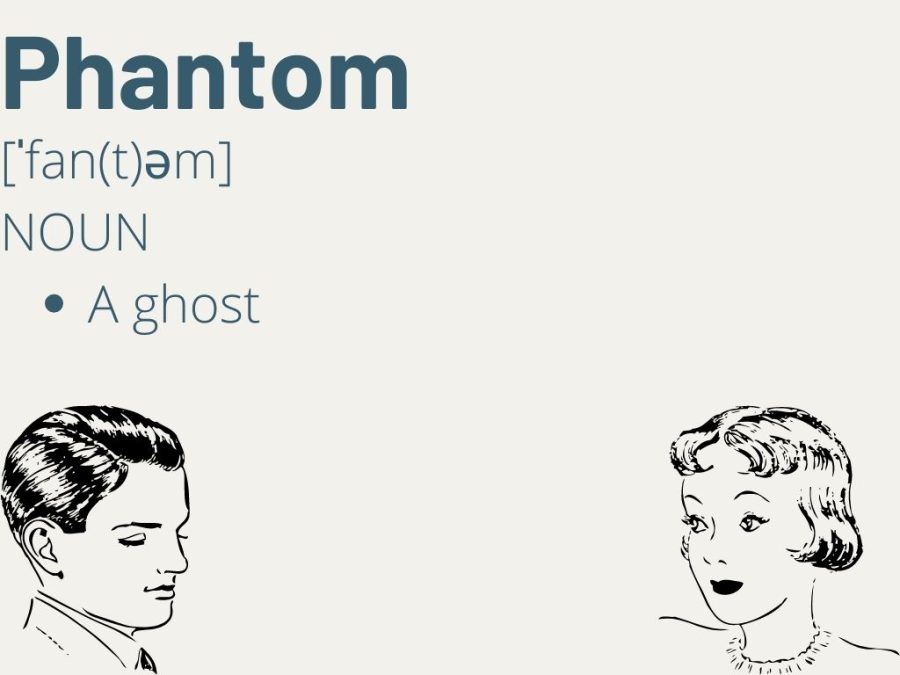Sound of silence: Tinnitus
Syed Ali Naqvi (made with Canva)
Individuals suffering from tinnitus hear phantom sounds without an external source, making it harder to hear or understand others, even in quiet places.
“It’s always there. I never have a ‘quiet’ moment,” said David Kahn, 64, during an interview about his tinnitus. “It can wear you down and become a real pain. Kinda just have to live with it.”
Kahn is one of many individuals who experiences tinnitus, a common condition in the U.S.
According to the American tinnitus Association, the National Health and Nutritional Examinations survey showed that approximately 20 million individuals in the US alone experience tinnitus, with two million having severe or debilitating tinnitus. About 30% of the individuals who said they have some form of tinnitus argued that it was an issue in their life, either on a moderate or severe level.
What is tinnitus?
Tinnitus is defined as a constant sound in the ears despite the absence of a source. The person experiencing the condition will usually hear a ringing sound, but there are other variations that include a static or buzzing sound. There are also different types of tinnitus: subjective, objective, neurological and somatic. In subjective tinnitus, only the person affected by the condition is able to hear the sound. This type of tinnitus can come and go, sometimes lasting three to twelve months. In some extreme cases though, the sound doesn’t stop. Objective tinnitus is a rare form of tinnitus, where the sound is being caused by vascular deformities or involuntary muscle contractions. There are many causes for objective tinnitus, but the important distinction is that it can be permanently fixed if the underlying cause is determined and taken care of. In some cases, tumors in the cervical or cephalic region can cause this type of tinnitus. If the tumor is removed, it can be a permanent fix for the phantom sounds the individual is hearing. Neurological tinnitus usually occurs when something is interfering with the brain’s auditory functions. This is usually a result of a condition, such as Meniere’s Disease, which causes episodes of vertigo. Vertigo is the spinning sensation some individuals experience when their inner ear is damaged in some way. Somatic tinnitus, which is also known as conductive tinnitus, is usually caused by or related to the sensory system. In this case, the sensory system can sometimes cause or worsen the sound being heard. Physical actions are usually the base cause of somatic tinnitus. Additionally, the blockage of external sounds can cause this form of tinnitus. Normally, our brain is too busy hearing external sounds like cars on the road, wheels of a shopping cart, or pencils on paper. But when something blocks these normal everyday sounds, our brain begins to pay more attention to somatic sounds. An example of this is earwax buildup. When there is too much earwax in the ear canal, it can block sounds from effectively reaching the eardrum.
What are other causes of tinnitus?
In most cases, tinnitus is caused by hearing loss or damage to the ears. Sensory cells in the cochlea can eventually become damaged through our lifespans, or when they are repeatedly exposed to loud sounds. Naturally, the sensory cells give off electrical signals to the auditory nerve only when moved by sound waves. When bent or damaged, however, the sensory cells tend to give off false electrical signals. Damage to the sensory cells and false messages to the brain is what ultimately causes tinnitus in most cases. Injuries to the head or neck region can also result in false sounds. Here, the nerves related to hearing, or the brain itself can become damaged in certain areas. If areas that are related to hearing become damaged during an incident of any sort, the person may begin experiencing tinnitus, though this may only occur in one ear rather than both. In addition to incidents, tumors in the head or neck region can also lead to tinnitus if they begin to interfere with structures related to auditory functions. Surprisingly, injury or sickness isn’t the only cause of this condition; specific medications can be a cause of tinnitus. Though there is a larger list, some of them include antidepressants, cancer medications, or even antibiotics. However, a notable distinction with this cause of tinnitus, as well as any tinnitus that is only obstructive and not damaging, is that it can likely be stopped if the underlying reason is taken care of. For those who are experiencing tinnitus due to medications, stopping usage can be a fix for the phantom sounds. Those with a tumor that is obstructing auditory structures and functions, however, will likely need the tumor to be successfully removed without doing damage to the auditory nerve or other surrounding structures. In both scenarios, the tinnitus can be fixed if the underlying cause is taken care of successfully. However, if the primary structures that aid in hearing, such as the sensory hair cells in the inner ear, are damaged, it will lead to a form of tinnitus that will be virtually incurable with our current medications and treatments.
Clinical trials: an ongoing effort
As of now, there are no known fully developed treatments or cures for tinnitus. Though objective tinnitus can be fixed when the cause for the ringing is removed, such as a tumor pressing on specific nerves, other forms of tinnitus are not curable with such a procedure. In most cases, a person’s sensory cells are damaged, resulting in tinnitus that is almost certain to be permanent. Hearing aids and cochlear implants have shown some success to make the ringing less noticeable, but it may not work for everyone. Despite this, there is hope. The University of California Irvine is currently working on a device that can help momentarily stop the ringing individuals with tinnitus experience. The breakthrough has been featured on UCI’s Giving Day website with slight insight to the progress researchers are making on the University campus.
UC Irvine’s site states that, “The researchers at UCI, under the leadership of Dr. Hamid Djalilian, have found a way to electrically stimulate the inner ear to temporarily stop ringing in the ears, known as tinnitus. They are currently testing a breakthrough device that, unlike any other in the world, shows promise to treat tinnitus permanently.”
Upon visiting UCI’s webpage for clinical trials, it becomes clear that work is still being done on the device and the clinical trial is estimated to be completed on the 31st of July in 2022. The page also shares other information, such as how the device is theoretically supposed to work, as well as the purpose of their ongoing clinical trial. “It has been found that electrical stimulation of the inner ear can reduce and in some cases eliminate tinnitus. The purpose of this research is to investigate both acoustic and electrical stimulation of the inner ear as a possible treatment of tinnitus.” The ongoing research on the condition and possible treatment sparks hope in the hearts of those affected. For more information, please visit UCI’s web page dedicated to their clinical trials, or the National Library of Medicine, otherwise known as the NIH.
Kahn’s story
Kahn has been living with tinnitus since childhood and has had many experiences with doctors who’ve tried to resolve the ringing.
“I’ve had ringing in my ears since childhood so I’d say I first noticed it about 60 years ago,” said Kahn. “The summer before my sophomore year of high school I saw a doctor about it and he saw that I had a perforated eardrum.”
Kahn believed it was important to note that this specific experience was long before tinnitus was “a thing.”
This explains the following of Kahn’s experience: an attempt to resolve the ringing from a procedure to fix the eardrum. “So he operated and, in doing so, severed the nerves for the taste buds on one side of my tongue. And the operation did nothing for the ringing,” he said.
Kahn explained a number of other doctors he had met and procedures he underwent, along with medications for the side-effects of the surgeries; all of the treatments Kahn had tried were unfortunately unsuccessful. Despite Kahn’s experiences, however, Kahn made it evident during the interview that he’s been able to continue his life with the condition.
“Most of the time I ignored it since it wasn’t as omnipresent as it is now … Can’t say that it kept me from doing anything,” he said.
The condition certainly does present itself with some challenges that most other people wouldn’t experience as often as someone with tinnitus does. One of these challenges can be difficulty understanding another person during a conversation.
“I sometimes have to ask people to repeat themselves because it can interfere with my hearing,” he said.
Kahn also provided an example of what he and other individuals with tinnitus hear on a daily basis.
“Have you seen the movie ‘Baby Driver’? Even before you see any titles or action (only a blank screen) you hear a steady tone. That’s because the titular character (Baby) has tinnitus,” he said.
Those who haven’t seen the movie, or may not have the chance to do so, can think back to being at a concert.
“If they’ve ever been to a really loud concert where they were close to the speakers and after the show their ears were ringing. That’s me 24/7,” Kahn said.
MCHS students and tinnitus: student interview and statistics
“I’ll describe my experience,” said MCHS senior Rebeca Gonzalez, when asked about her experiences with tinnitus.
“I’m sure people have watched those videos that are like ‘What’s the highest frequency you can hear?’ Imagine the highest frequency you can hear always playing … imagine if you hear static on a TV and pitch it up a little. It’s constant.”
Listening to something helps individuals such as Gonzalez cope with tinnitus.
“I’m constantly listening to something whether it’s music, (or) background noise to avoid silence,” she said.
To inspect the understanding of tinnitus at MCHS, Gonzalez along with other students took part in a survey that was conducted and pushed out through electronic mail. Here are the results.
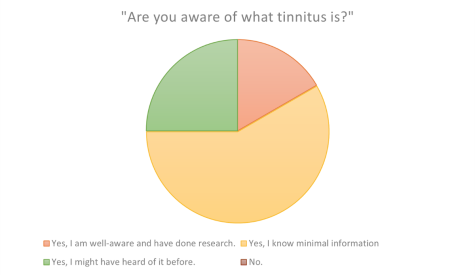
The orange, 16.7%, shows the number of students who admitted to being well aware of the condition. The green, 25%, shows the number of students who believe they might have heard of the condition before. The yellow, majority being 58.3% admitted to knowing minimal information about tinnitus. According to this data, we can conclude that most students at MCHS are aware of the condition.
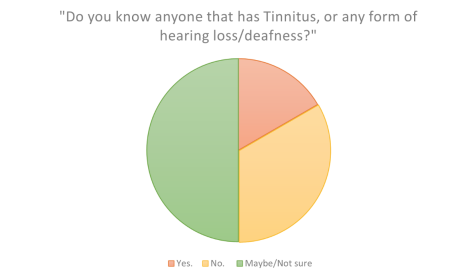
The orange, 16,7%, is the number of students who know someone with tinnitus. The yellow, 33.3%, is the number of students who do not know someone with tinnitus. The green majority of the student body being 50%, is the amount of individuals at MCHS who do not know someone with tinnitus. From this, we can conclude that most students either do not know someone with tinnitus, or they aren’t aware that people around them have tinnitus.
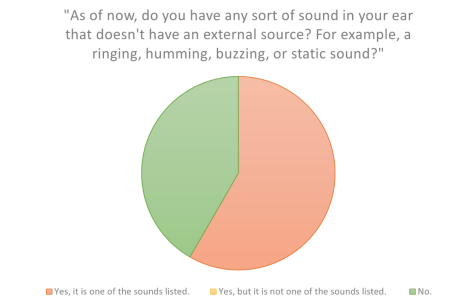
The green, 41.7%, is the number of students who were not able to hear any sounds without an external source, such as a ringing, static, or other sound. The orange being the majority of the student body, 58.3% is the amount of students who agreed to hearing a sound without any external source. Though this is not a proper diagnosis, it gives an idea of how many people can have tinnitus in even a small school.
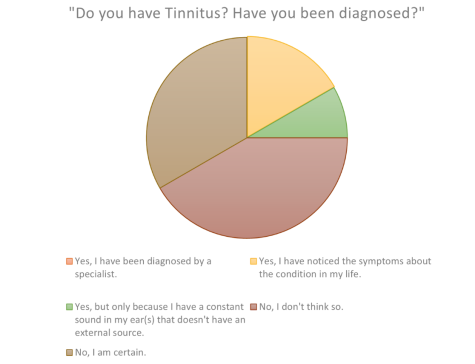
The green, 8.3%, is the amount of students who, according to the sounds in their ears, might have tinnitus.
The yellow, 16. 7%, is the amount of students who agreed to having the symptoms in their lives. The brown, 33.3%, is the amount of students who believe they do not have tinnitus and are certain of it. The light brown, being the majority of students at 41.7% is the amount of individuals who don’t think they have tinnitus but also aren’t certain of it.
Tinnitus: the sound of silence
I have been living with tinnitus for some years now. To the attentive few, you may have noticed my bad hearing, otherwise it likely went unnoticed, even for those who’ve known me for some time now. Only a few people have learned about the phantom sounds I hear daily, and only because they’ve noticed my hearing issues. I’ve become used to hiding it from people so some don’t notice it, but sometimes it shows. I don’t mind the sounds as much as the experiences they lead to, which are almost always negative and bad memories. As tinnitus plays through my ears, other sounds around me are drowned out. Natural sounds, such as whatever is coming through my computer’s speakers, the environment, or people’s voices become drowned out by the ringing. They’re still there, but hearing them becomes difficult, sometimes challenging. In some cases where there are multiple sounds to process, and I get confused because I have to choose what to focus on. It results in confusion and difficulty deciding what sound or stimuli to focus on more since I have to choose. The tinnitus usually causes other sounds to become muffled as well. In other words, I can hear the sound of a person’s voice, but can’t make out the words being said; I can tell it’s English but am unable to decipher the words. I have to often ask people to repeat themselves, leading to awkward situations. Other times I have to focus so much on trying to hear the person and reading their lips that I forget to focus on what I’m hearing. I essentially forget to focus on what the person is saying because of the amount of attention it takes to try and drown out the tinnitus, which can’t really be drowned out at all. I have tried to read people’s lips to help me “hear” for sometime now. However, as you all know, masks are currently a requirement; reading lips isn’t very effective as a result of that. Coming back to school was challenging and scary not only because of the pandemic and it’s changes, but also because I had to go to school without having a chance at reading lips. Adding onto this, I couldn’t rely on text like I did during the pandemic, either. When I couldn’t hear something clearly, I could always check Zoom’s chat for written instructions most educators would leave for students. However, since coming back to in-person school, I’ve constantly been placed in situations where I was unable to hear and had no form of text to rely on as I did normally during online classes. Other than instructions on a white board or on my laptop screen, I’m constantly left processing instructions and the ringing sounds, as well as other natural sounds. I can remember countless situations where I have misinterpreted someone’s instructions in some way, leading to trouble completing a task, or the task being completed in the wrong way. Though I am a very optimistic individual, this has given me doubts at times for attending a university in the future or getting a job. I can’t help but think how many other individuals living with tinnitus are also afraid of following their dreams because of such fears.
In addition to the way it makes public situations difficult, tinnitus can also be something that puts a person in a negative place psychologically. A constant, never-ending sound can become difficult to live with at times, especially during stressful situations. The ringing becomes another stimulus to process while there may be a lot going through your mind, making it a bad combination for those with anxiety. Some people certainly become “used to it,” but I often wonder about those who don’t, or those who are young and may not have someone to turn to, or more specifically, those who don’t have anyone to explain the condition to them. Tinnitus is something that is often permanent and coming to terms with that can be difficult. Coming to terms with tinnitus means that you will always have trouble hearing others and things you’ve always loved hearing. It means doubting your career path because you’re afraid of the chance of making mistakes based off instructions you weren’t able to hear and for those whose tinnitus is permanent, it means somehow coming to terms with the fact that you will never hear silence again-that your silence has now become a sound, one of a constant pitch. Some people cannot listen to something to drown it out. Some may not have anything to listen to. Some may not be able to block it out because of its intensity, which can increase if more damage is done to the ears. I have tried using sounds to block out tinnitus when I am working or studying; the sounds of rain and white noise seem to be effective, but only on a loud setting (playing sounds at that sound would only worsen the condition). Even with sounds playing to block out the tinnitus, I can still faintly hear the ringing. I want others to be aware of this because it shows the truth of the condition: some may not be able to block out the sounds at all. The understanding you give others can mean more than anyone can imagine.
Unless there is a cure made for tinnitus, or a treatment that permanently fixes the issue for even those with damage to their hearing, people with tinnitus will likely live with the condition for the rest of their lives. I don’t think anyone with tinnitus wants pity of any kind, but rather understanding. The next time someone asks you to repeat yourself, please don’t feel inconvenienced in any way; try to remember that some people may be suffering from hearing loss or damage, and ultimately tinnitus as well. The person next to you, who often seems lost in class instruction or distracted, may simply be hearing sounds that no one else has to hear and struggle with. They may be doing their best to pay attention to instructions but aren’t able to as result of their hearing issues.
I am certainly in no way implying that others are not understanding, and I applaud those who are. I simply hope that everyone can be more aware of tinnitus, and that anyone can be struggling with it. It isn’t something that can be seen, and for those who don’t have, it isn’t something that can be heard, either.

I love rain, I love cold weather with a cozy setting, and I want to learn multiple languages.
































